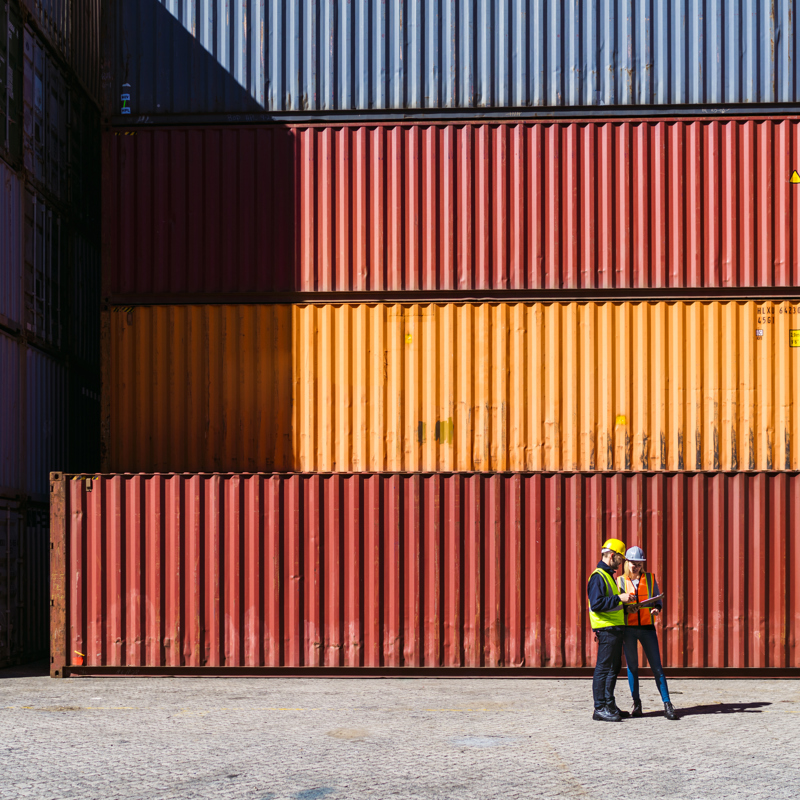
- Blog
How supply chains are re-defining resilience through smarter network design
A recap of the Roland Berger × Infios webinar on building...
Explore the top sustainability trends shaping the supply chain industry in 2025 and discover how innovative practices and solutions are driving a greener, more efficient industry.

In 2025, sustainability is becoming one of the biggest forces reshaping supply chain strategy.
It’s more than efficiency; it’s also about building systems that can adapt, scale, and support both business growth and the planet. From cutting emissions to improving transparency, sustainability is now central to how supply chains deliver value.
Here are the key sustainability trends set to shape the supply chain industry in 2025 and how forward-thinking solutions, like those from Infios, can help businesses take meaningful strides.
Supply chains account for more than half of global greenhouse gas emissions. Eight major supply chains that include food, automotive, and electronics drive much of that impact. [1]
The pressure to decarbonize is only intensifying. Businesses are being pushed to cut emissions across logistics, transport and warehousing without sacrificing service quality.
What’s working? Smarter route planning, better fleet efficiency and tighter visibility into transportation costs. Together, these steps save money and reduce emissions.
Through the combined power of Freight Audit and Payment (FAP) and Transportation Management System (TMS), companies can streamline their transportation operations, cut emissions and meet ambitious carbon goals without compromising service quality.
How Infios helps:
By combining Freight Audit and Payment (FAP) with Transportation Management (TMS), companies can streamline transport, optimize fuel use and track carbon goals alongside cost savings.
Customers want to know where products come from and how they’re made.
By 2025, digital traceability that includes tracking goods from origin to final delivery will be standard.
70% of consumers say they’re more likely to buy from brands that can prove full product traceability. This goes beyond compliance to trust building. [2]
How Infios helps:
Incorporating digital platforms that support traceability is essential. Infios’s warehouse management systems (WMS) offer powerful visibility and inventory tracking capabilities, enabling businesses to maintain accurate data at every supply chain stage, building trust with consumers and partners alike.
Learn more about traceability with Infios’s warehouse management systems (WMS).
The circular economy is moving mainstream. Instead of “make, use, throw away,” supply chains are reusing, refurbishing, and recycling.
According to Accenture, circular models could cut emissions by up to 40% while boosting growth by 4%. Reverse logistics is the engine here that includes handling returns, remanufacturing and secondary use. [3]
Designing supply chains that feed back into production allows companies to minimize waste, cut costs and improve resource efficiency.
How Infios helps:
Infios supports these initiatives by offering solutions that streamline inventory, returns management, and enable efficient handling of returns and remanufacturing processes.
Businesses can implement circular practices by using technology to manage returns effectively, reinforcing their commitment to sustainability.
Read more about Infios’s Order Management System and Slotting Solutions optimize inventory placement and streamline fulfillment processes to support sustainability.
Warehouses are energy-intensive and demand is rising. The IEA predicts a 30% jump in energy use in warehouses by 2030. The answer isn’t more energy, it’s smarter energy .[4][5]
Robotics, automation, and intelligent controls can reduce waste by scaling energy use to demand.
By 2025, many facilities are expected to incorporate energy-efficient technologies, including robotics and automated systems, which can optimize energy use during high-demand periods and scale back during off-peak hours.
How Infios helps:
Infios’s Autonomous Mobile Robots (AMRs) and warehouse automation solutions allow businesses to operate more efficiently, reducing the need for constant lighting, heating, or cooling across large warehouse spaces.
Small adjustments across multiple facilities can yield significant sustainability gains.
Read more about Infios’s flexible scalability with Autonomous Mobile Robots.
Plastic waste is under the spotlight, and packaging is one of the biggest culprits. McKinsey estimates that a 10% cut in packaging could save nearly 50 million tons of CO₂ annually. [6]
Brands are already responding: Amazon’s Frustration-Free Packaging program has cut packaging waste by 500,000 tons since launch. Expect more companies to follow suit in 2025, with eco-materials and minimalist designs that protect products without over-packaging. [7]

The “last mile” is often the most carbon-heavy part of logistics and the costliest. It accounts for over half of logistics costs and a large share of emissions.
Electric vans, bikes, drones, and smarter route consolidation will be central to reducing last-mile emissions by 20–30% in the years ahead.
For customers, this means fast delivery and lower environmental impact. [8]
By 2025, businesses will explore multiple last-mile options to meet demand in a greener way.
Environmental, Social and Governance practices (ESG) go beyond environmental concerns, extending to social responsibility within the supply chain.
Studies show companies that prioritize fair wages, safe working conditions, and balanced workloads see up to 12% higher productivity and lower turnover. Customers are also rewarding brands that prove ethical practices across their supply chains. [9]
How infios helps:
Our Labor Management Solution optimizes workforce allocation, reduces strain, and supports safe, sustainable workplaces.  workloads and creating a safer, more sustainable work environment.
workloads and creating a safer, more sustainable work environment.
Find out more about the Labor Management Solution at Infios.
The trends are clear: sustainability is becoming a baseline expectation. By 2025, companies that link sustainability with measurable business outcomes such as lower costs, more resilience, stronger trust will be the ones that thrive.
From carbon reduction to ethical labor, Infios helps businesses adopt solutions that are modular, measurable, and scalable.
References:
[1] World Economic Forum: Supply chains can be a climate game-changer. Here's why. https://www.weforum.org/agenda/2021/01/tackling-supply-chain-emissions-is-a-game-changer-for-climate-action/
[1] World Economic Forum: Supply chain sustainability is key to achieving climate goals: Here's how organizations can get started. https://www.weforum.org/agenda/2023/04/why-supply-chain-sustainability-key-to-achieving-climate-goals/
[2] Accenture: How supply chain sustainability helps unlock resilience and growth https://www.accenture.com/us-en/insights/supply-chain-operations/supply-chains-key-unlocking-net-zero-emissions
[3] Accenture: The power of circular venture building https://www.accenture.com/nl-en/blogs/insights/the-power-of-circular-venture-building
[4] Mckinsey: Playing offense with green tech to achieve net-zero emissions https://www.mckinsey.com/capabilities/mckinsey-digital/our-insights/playing-offense-with-green-tech-to-achieve-net-zero-emissions
[5] [9] Bain: Operations and Supply Chain Decarbonization: Lower Emissions, Higher Performance. https://www.bain.com/insights/operations-and-supply-chain-decarbonization-lower-emissions-higher-performance-ceo-sustainability-guide-2023/
[6] McKinsey: Decarbonizing logistics: Charting the path ahead. https://www.mckinsey.com/capabilities/operations/our-insights/decarbonizing-logistics-charting-the-path-ahead
[7] World Economic Forum: Supply chain sustainability is key to achieving climate goals: Here's how organizations can get started. https://www.weforum.org/agenda/2023/04/why-supply-chain-sustainability-key-to-achieving-climate-goals/
[8] BCG: Why Some Companies Are Ahead in the Race to Net Zero. https://www.bcg.com/publications/2023/why-some-companies-are-ahead-in-the-race-to-net-zero-and-reducing-emssions
